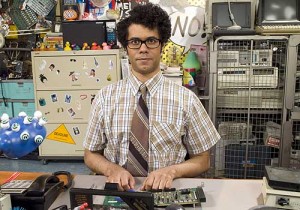
Welcome to this week’s ‘The Monday Interview’.
IT is arguably one of the industries that have seen the most dramatic changes over the last few decades. I can remember personally the boom of the late 1990’s and early 2000’s as I worked as an in-house recruiter for a European IT services company. We couldn’t recruit fast enough and I was kept very very busy! But then the came the bursting of the dotcom bubble and a sense that universities were churning out computing graduates and a rate faster than employers could take them on. It really has been ups and downs.
And then there’s the small matter of offshore software development. Lots of students that I speak to write off a career in IT because they are unconvinced that it has a future at all in the UK. Well, todays contributor, wishing to be known only as Maurice Moss (fans of ‘The IT Crowd’ will appreciate that reference) will hopefully help to put minds at rest that this is not the case. Maurice has been working in the IT industry for 15 years now, currently as a Technical Architect for a large employer. As well as giving us some really useful information about the skills needed to work as an IT professional, he argues that there is still a great employment need for people with strong technical skills.
And some good news for those of you currently pondering a career in IT; yes, we’ve had a couple of lean years with regards to graduate recruitment but the signs are showing the 2012 is going to be a good year for computer science graduates :)
Over to you Maurice, and thanks for your contribution.
So, briefly, what is your job?
“I work for a large company, in the IT function. My key responsibility is to define the companies IT strategy around the software we create, buy and deploy; and ensure that those software interoperate well. I am then responsible for working with others such as company directors, programme managers, software developers and so on to ensure it gets delivered correctly.”
How did you get into it?
“I’ve always had a strong interest in technology. I started programming computers at about 8 years old. I later, whilst at university, started running a website, this was in the early years of the internet. I was making some money from that and it was at that time I decided I wanted to work with software when I graduated. I landed a job via the milk round with a large IT services company.”
Describe a typical day.
“My days vary greatly. I work with almost every level of employee within the company from minimum wage staff through to board directors. I do a lot of problem solving, from the easy to understand like how many lines are there in a postal address to optimising distributed systems within the constraints of physics.”
What do you enjoy most about your job?
“I enjoy creating working IT systems that adds real value to people’s lives.”
And the least?
“Office politics.”
What are the common misconceptions that people have about the work you do?
“Most people think that IT is desktop support.”
What are the main skills you need to work as a technical architect?
“Strong technical skills are a given. You need to be able to pick up how business works quickly and then map that to technology. You then need influencing and communication skills and then leadership skills to bring everyone together to actually make it happen.”
Tell us a little about the benefits that come with the job.
“Generally speaking, the IT function pays pretty well but just how well it pays will depend upon the industry you are working within and the company you are working for.”
What advice would you give someone wanting to break into this career?
“Most graduate recruiters these days will ask for students with a maths, engineering or science degree background. However, it is possible to enter the IT industry from other degree disciplines too, particularly if you are looking to do a non-technical function such as project management. Whilst a lot of the hands on technical skills are being offshored to Eastern Europe, China and notably India, the industry is still crying out of strong technical people locally. So make sure you have these skills. That alone is not enough, you will need a full range of business and people skills too.”
Where do you see yourself in 10 years’ time?
“I’d like to be the CTO for a blue chip company.”
AND JUST FOR FUN…
First in the office or last to leave?
“Sometimes both, sometimes neither, depends on what’s going on. I think it is very important not to work too many long days as it is counterproductive; you are too tired to do a good job all the time after doing that.”
Tea or coffee?
“Coffee in the morning, tea in the afternoon.”
Staff canteen or packed lunch?
“Canteen.”
The lift or the stairs?
“Stairs.”
###
Out after work or straight home to bed?
“Home, unless there is a good excuse…”